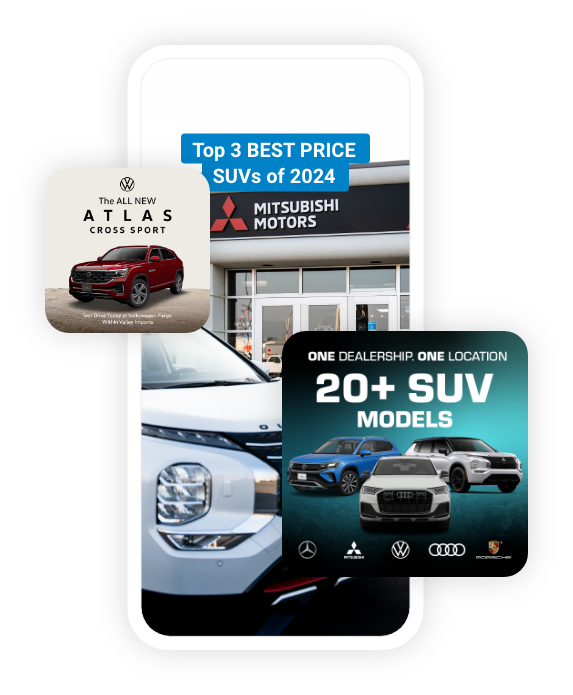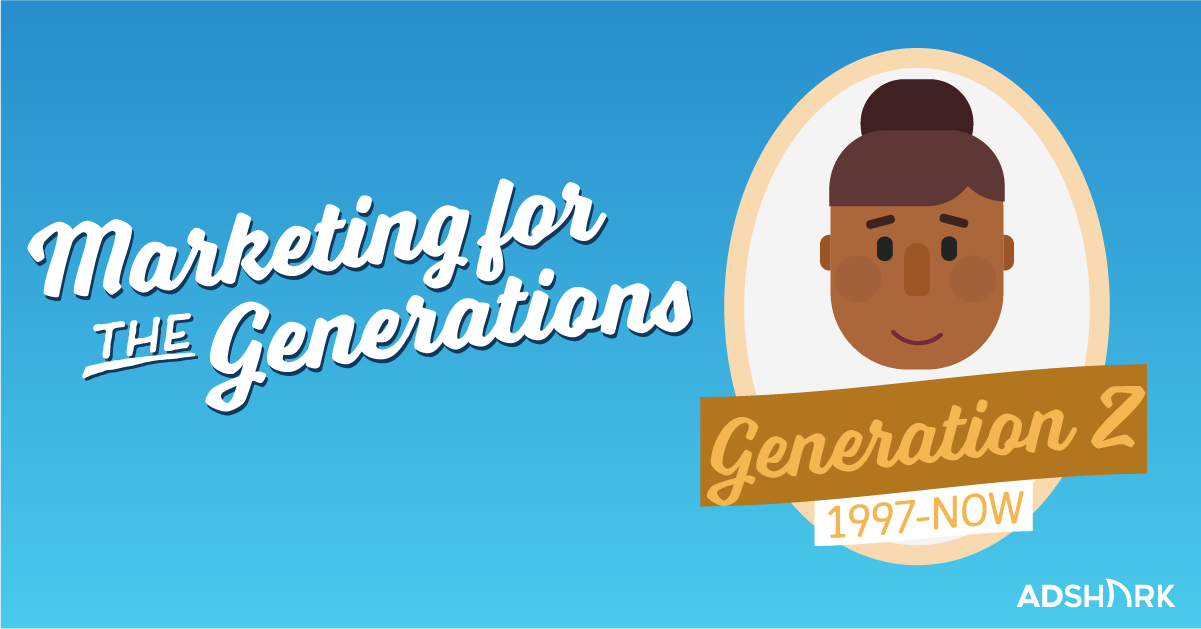Marketing to Gen Z: Why We Need to Embrace the Next Generation
Marketing to Gen Z is becoming a hot topic. As it should be. The oldest of the generation are graduating college and entering the workforce. Unfortunately, every couple of years a flood of articles come out saying something like, “Why the newest generation is going to ruin everything for everyone.” It’s an easy assertion to make about a new generation. But stereotyping an entire generation while focusing on the negative doesn’t work.
And we, as marketers, have learned our lessons from generations that came before. The idea that Boomers don’t understand technology or that millennials only want gifs just isn’t true. However, we can use statistics and trends to understand how this generation’s experiences have affected their interaction with brands and technology today. For instance:
- Gen Z is by far the largest generation in America.
- They have a whopping $150 billion spending power right now.
- Experts predict that Gen Z will account for 40% of US consumers by 2020.
Introducing Gen Z
Gen Z is a brand-spankin’ new generation that was born around the time the rest of us were getting frosted tips and riding around in Heelys.

According to Pew Research, Gen Z is made up of anyone born in 1997 and later. As of 2020, they include people ages 23 and under. Older Gen Zs are starting to make purchasing decisions on their own. Gen Z is now the largest generation, making up more than 90 million people.
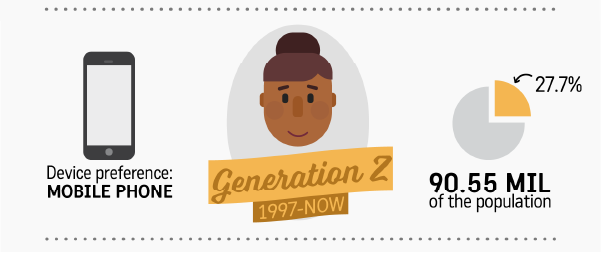
Events That Shaped Gen Z Lives
The majority of Gen Z were too young to remember 9/11 or understand it. However, they did grow up during the 2008 recession, the election of Barack Obama, the explosion of social media, and, most likely born holding a smartphone. (Probably not, but they don’t know a world without the internet.)
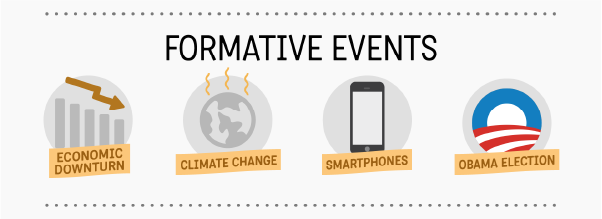
Gen Z Character Traits
Everyone from college professors to industry experts have focused on Millennials for years now. Grouping them into different stereotypes—negative and positive. To the point that the term, “Millennial” seems to be synonymous with young.
But…it’s time for marketers to reassess that mindset and start focusing on marketing to Gen Z, because they have their own character traits, likes, and dislikes.

Gen Z is Skeptical
While they show some similarities with their older counterparts, Gen Z is way more skeptical and less trusting of others.
Gen Z is Internet Savvy and Hyper-aware
Because Gen Z has never lived without technology, literally in the palm of their hands, they are known for being internet savvy, creative, innovative, social, visual and hyper-aware of what’s going on around them.
Gen Z Can Tune You Out
But they are also impatient. Studies claim that Gen Z has an average attention span of around 8 seconds. Which is much shorter than the average Millennial’s attention span of 12 seconds. While this seems like it could be a negative thing, especially for marketers seeking their attention, what it’s really showing is that they are pretty good at tuning things out that they consider irrelevant. And they can tell almost instantly if a message is irrelevant to their needs. So Gen Z marketing needs to take into account how important those first 8 seconds are.
Gen Z Wants User Reviews
Not only has Gen Z always known a life connected online, they have also always had access to user reviews and user-generated content through Amazon, video testimonials and reviews, and social media influencers. It’s word of mouth on steroids.
Not only are they looking for reviews, they rely on it. 86% of Gen Z relies on user reviews before making a first-time purchase with a brand. And it’s not just one or two testimonials. They expect to see hundreds of reviews. And they want to see how consumers are using the product with video and images. It’s no longer an extra feature for brands to have this ability. It’s now a necessity.
Gen Z is Socially Conscious
Let’s face it, Millennials got a bad rep out the gate. They didn’t even have a shot to show their entrepreneurial side, or showcase that they wanted to work smarter, not harder before they were characterized as lazy, entitled and not loyal.
Well, Gen Z realized that too and are already worried about how the world views them. There is already a focus on them being narcissistic and entitled when in reality they are growing up in a world where their values will make a difference. They are socially conscious and committed to sustainability because they feel the pressure from the lack of action by the generations before them.
And like Millennials, Gen Z wants brands to not only commit to causes they value but to be vocal and proud of the work they are doing. Doing so will develop lifetime brand loyalties. But brands have to be careful. Because Gen Z will see right through inauthentic brands.
Gen Z’s Relationship with Technology
It’s no secret that Gen Z and technology almost go hand in hand. In fact, they are known as the “Digital Natives” generation. And they freely admit they depend on it. Their lives are lived both online and offline. 96% of those aged 16-23 already own a smartphone, which is a larger percentage of ownership than any other generation.
On average, they spend more than 85 hours a month on their phone, making smartphones their preferred device. If you plan to market to this generation, your website better be mobile-friendly and don’t bother wasting time and money targeting them on desktop.
Gen Z and Social Media
Another not so surprising stat is that Gen Z isn’t really into Facebook. They see no real value in using Facebook when there are similar, more engaging, fluid, and constantly changing social platforms like Instagram and Snapchat.
In 2016, Snapchat surpassed Facebook as the most popular social network among US teens. And that trend doesn’t seem to be slowing down. Experts predict Snapchat will gain an estimated 1.2 million users ages 12-17, while Facebook will lose around 2.2 million of that same audience by 2022.
Ok, ok…I know what you’re thinking, and I agree. Prematurely jumping ship on Facebook would be a really, really bad idea. Facebook is by far the largest social media platform and everybody knows this. But when marketing to this generation you need to be prepared to focus on other channels.

What Are My Options for Marketing to Gen Z?
The biggest takeaway is to be authentic and real. Gen Z knows technology and understands advertising.
Places to Advertise
Start by meeting them where they are. Online it’s social media platforms like YouTube, Instagram, and Snapchat.

They are also researching products online, so paid search is still a valid option.
Google Ads, when done correctly, can be extremely effective even for the youngest generation.
Writing your Ads
Because they care about User-Generated content and reviews, focus on that. Look for influencers in your industry—even micro-influencers work with this generation.
Include your product reviews in your Google Shopping Ads.
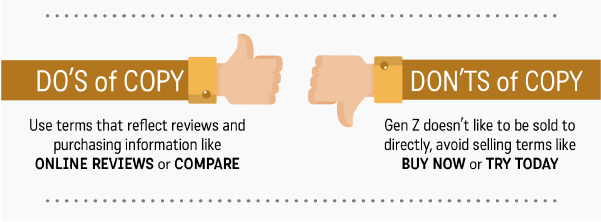
Use terms that reflect reviews and purchasing information in your paid search campaigns. Terms like “online reviews” or “compare”.
Just remember that Gen Z doesn’t like to be sold to and can sniff out irrelevant content immediately. Avoid selling terms that push them like “buy now” or “try today”.
8 Tips for Marketing to Gen Z
1. The most important messages go first.
You have 8-seconds to get your message across before they deem your content irrelevant. Hold their attention with entertaining, educational or user-generated content.
2. Include user-generated content (UGC).
I don’t think we can say this enough. User-generated content is going to be king with this generation. So put a plan in place to start gathering it now. You’ll be ahead of the curve as they continue to get older.
3. Share your values.
Gen Z is fighting for their values. Make sure you live and breathe your mission, vision, and values as a company. Don’t let them be just words on a website. Look at companies like Zappos, REI and Tom’s Shoe for examples of how to excel at living your mission as an organization. Partner with a non-profit or cause to take it a step further.
4. Find influencers in your industry.
Gen Z is obsessed with social influencers. They are more likely to trust friends, even people within their social networks they have never met in-person, over brands. So it’s time to re-think targeting major celebrities and start researching social media influencers within your industry.
5. Optimize for mobile.
Gen Z loves their smartphones. They grew up with them. So they are constantly using them. Optimizing your site for mobile is essential to being successful with this generation. A seamless mobile experience will help improve conversions for any user.
Take it a step further by adding a mobile app and you will be steps ahead of your competition.
6. Use paid and organic digital marketing.
Contrary to popular belief, Gen Z still conducts searches on Google. And to cast a wide net, paid search is still a viable option. Just make sure you’re including information about comparing products or user reviews in your ad copy. And mix organic social media posts with paid posts. Just remember you have less than 8 seconds to capture their attention.
7. Shopping on Instagram
Instagram is realizing its impact on online shopping, so they are prioritizing in-app experiences with shopping. Using the shopping feature, users can click on product details and it will take them right to the product detail page of your website.
They are currently beta-testing checkout for some Instagram business accounts to make it even more seamless of an experience for the Instagram user.
8. Video content is king.
Bill Gates famously said, “Content is king,” more than 20 years ago! And while that statement still holds true, Gen Z prefers video over the written word. So when you can, use video to capture their attention. Make sure it’s educational, entertaining and funny.
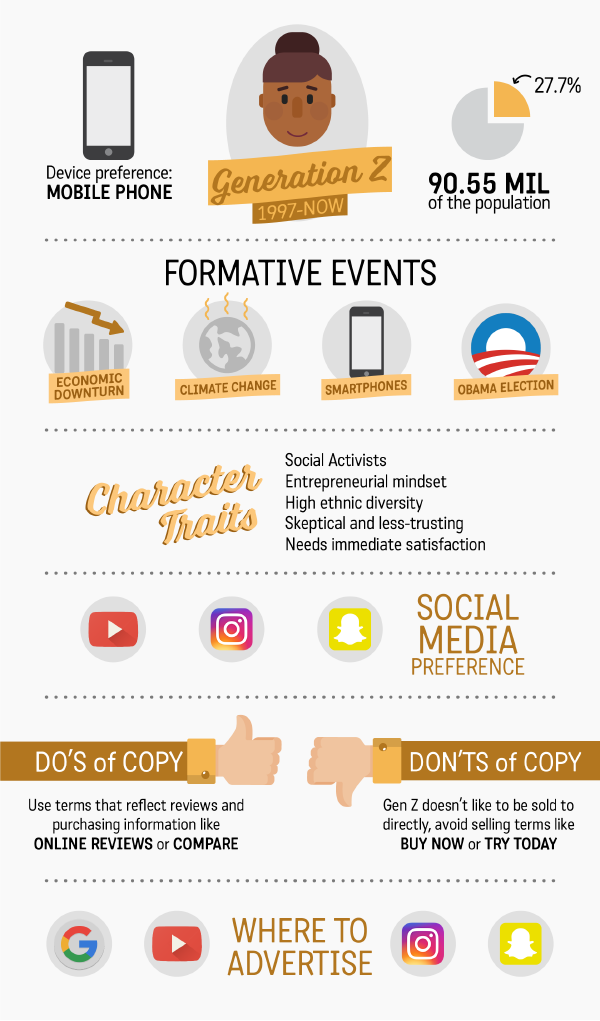
The Future of Gen Z
Gen Z isn’t going anywhere. Businesses and marketing professionals everywhere should be scrambling to connect with this huge digital generation because getting ahead of these marketing trends will make it or break it for businesses of the future. It may not be today or tomorrow, but someday we will be catering our advertising to this overwhelming cultural shift one way or another. Get ahead of it now while there’s still wiggle room for mistakes.
Whether its updating your website, optimizing for mobile, or just getting your business on social media, take the initiative and start making the necessary changes and focus on marketing to Gen Z.
How Can AdShark Marketing Help?
If you’re ready to start implementing digital marketing tactics in 2020, AdShark can help with your paid search and paid social campaigns. Give us a call and we will analyze what you’ve been doing and how to improve your results to grow your business.
Ready To Grow?
Let's Talk!
